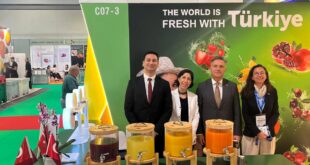The livestock sector is a cornerstone of economic growth, rural development and national food supply security. Red meat, milk and other animal products are not just a matter of food; they are also a strategic area at the heart of production, employment, and environmental sustainability.

Conditions have been changing rapidly in both the field and global markets in recent years. Red meat production in Türkiye, which was 2.38 million tonnes in 2023, is projected to decrease by 11.7 percent to 2.11 million tonnes in 2024. This decline reflects the contraction in small ruminant production and rising costs.
In contrast, raw milk production increased by 4.7 percent to 22.49 million tonnes. This increase demonstrates the vitality and resilience of the sector and demonstrates that there is room for improvement in efficiency, operating scale, and processing capacity.
The Key to Success in Foreign Trade Lies in Price, Quality and Logistics Management…
Türkiye holds a significant position with its production power and potential. However, simply increasing production volume is not enough for sustainable success; quality, traceability, animal welfare, brand value and logistics management must be addressed holistically.

Competitiveness in foreign markets is measured by trust and quality, as much as price. Therefore, value-added production and branded exports are key elements that will propel Türkiye to the next level.
Global milk and meat production soared, albeit slightly, between 2023 and 2024. Global milk production reached approximately 980 million tonnes, with Asian countries particularly prominent in the production increase.
In meat production, major players such as Brazil, the US and the European Union are expanding their production and export capacities. Brazil has strengthened its influence in the global meat trade with its record export volume.
Three Fundamental Transforming Forces: Climate, Cost and Technology
Three fundamental dynamics are shaping the future of animal husbandry today: the climate crisis, cost pressure and technological transformation.

Climate change affects the entire production chain, from feed to water; reducing the carbon footprint is no longer an environmental responsibility but a commercial necessity.
While rising feed and energy costs pose significant pressure on producers, data-driven production, genetic improvement, artificial intelligence-assisted herd management and automation systems offer powerful tools to turn these challenges into advantages.
Türkiye’s Strength and Potential…
Türkiye possesses great potential with its vast pastures, deep-rooted producer culture, dynamic domestic market and strategic location. When we support these strong foundations with the integration of science, technology and policy, our sector can go beyond mere self-sufficiency.

With surged productivity, an organized production structure and sustainability-focused policies, the country can become a regional supply hub and exporter of value-added products.
A Smart, Green and Fair Future…
The livestock industry of the future will be built on smarter, greener and fairer production, rather than simply producing more.
The decisions we make today will determine tomorrow’s food security and rural prosperity. Our mission is to combine the knowledge and experience of the past with the technology of the future.
When we achieve this, Türkiye will embark on a transformation story that is exemplary not only in its region but also globally.

By Dr. İsa Coşkun,
Türkiye Milk Meat Food Industrialists and Producers Association (SETBİR) Chairman of the Board of Directors
Source: www.tgdf.org.tr
 THE GLOBAL WINDOW OF TURKISH FOOD AND AGRICULTURE The Global Window of Turkish Food and Agriculture Sector
THE GLOBAL WINDOW OF TURKISH FOOD AND AGRICULTURE The Global Window of Turkish Food and Agriculture Sector








